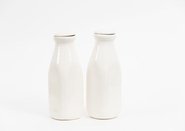Calcium in Water: Is it good for you?

Calcium in Water: Is it good for you?
Have you ever noticed a white residue on the inside of your kettle after boiling water? If you have, there’s nothing to worry about. That white substance is calcium, which exists as a dissolved mineral in water. Lately, the effects of calcium in water have been largely debated. Some argue that it can negatively impact the body, while others assert that water can help with the body’s daily calcium requirement. Should you be avoiding water with high calcium deposits? Or is it safe, and even beneficial, to drink water with calcium?
What is it?
To start, lets expand on what calcium is and what it does for the body. Calcium is a mineral, used mostly by our skeleton and muscles. It’s biggest role is strengthening and developing our bones, but also helps to regulate hormones, muscle contractions (helping our heart to beat), nerve impulses, and blood clotting. Our bodies do not create calcium, they only process and absorb it. We are only able to receive calcium from our diet, and/or supplements; therefore, it is vital that our calcium intake be enough to satisfy our body’s daily requirement.
Should you drink it?
Without realizing it, our body loses large amounts of calcium daily through our sweat, our skin, and when we go to the bathroom. If the body doesn’t receive enough calcium daily, it begins to rely on (and remove) the calcium in the bones. This isn’t a big deal at first, but overtime this can weaken the bones, causing ailments like Osteoporosis in older women or susceptibility to bone fractures after even a minor fall. If children don’t have a good daily intake of calcium, it might prevent them from reaching their full height as adults. The growth stage that requires the largest daily amount of calcium is adolescence, since this is the stage that sees the fastest bone growth. Teens need 1,300 mg of calcium daily, while adults aged 19-50 need 1,000 mg.
The body can absorb the calcium in hard water the same as it absorbs calcium from milk, or other calcium-enriched food. It’s for this reason that the U.S. National Research Council has said that drinking water can contribute to our body’s daily calcium requirement. However, the amount of calcium in water is much lower than the calcium levels in nutritious food. That being said, hard water is absolutely capable of providing us some of the calcium our bodies need.
Calcium collects in water when water pushes through rock and soil, extracting their minerals. This makes the water “hard”. Hard water has high concentrations of calcium and magnesium.
In recent years, hard water has been tested by many scientists and medical professionals for the potentially harmful effects of calcium on the body, but these conducted trials have yielded inconclusive results.
So then, if the calcium in our water actually benefits our bodies, is there anything “bad” about it? The concern around hard water is that it leaves behind a calcium residue on man-made products. The chalky white substance we see in our kettles also gets left behind in household pipes, or sticks to surfaces that are cleaned with water. Some of this calcium can be troublesome, or expensive, to remove.
What’s the best water for you?
We’ve established that the calcium in water is good for you, but what type of water should you be drinking? The answer is easy: spring water. Not only is it full of minerals like calcium and magnesium, which we now know are good for our bodies, but these minerals are what make spring water taste so amazing.
Cedar Springs spring water is the best water you can drink. It’s bottled daily, fresh from the spring and comes from deep beneath the earth’s surface, which helps protect it from contamination. Cedar Springs spring water travels through multiple layers of soil, removing pollutants and giving it the high mineral concentration that makes it taste so great, and helps to benefit your body so well.


















